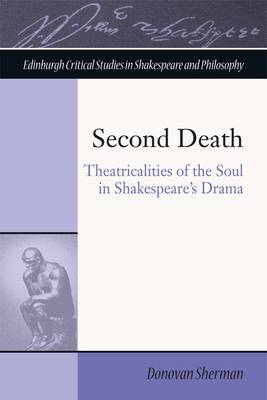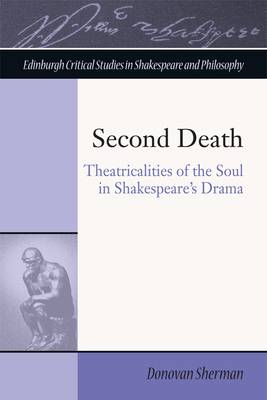
- Retrait gratuit dans votre magasin Club
- 7.000.000 titres dans notre catalogue
- Payer en toute sécurité
- Toujours un magasin près de chez vous
- Retrait gratuit dans votre magasin Club
- 7.000.0000 titres dans notre catalogue
- Payer en toute sécurité
- Toujours un magasin près de chez vous
Description
Illuminates our understanding of the soul as a historically and philosophically vital concept through Shakespearean drama
Second Death seeks to revitalise our understanding of the soul as a philosophically profound, theoretically radical, and ultimately--and counterintuitively--theatrically realised concept. The book contends that the work of Shakespeare, when closely read alongside early modern cultural and religious writings, helps us understand the soul's historical placement as a powerful paradox: it was essential to establishing humanity but resistant to clear representation. Drawing from current critical theory as well as extensive historical research, Second Death examines works of Shakespearean drama, including The Merchant of Venice, Coriolanus, and The Winter's Tale, to suggest that rather than simply being incapable of understanding or physical realisation, the soul expressed itself in complex and subtle modes of performance. As a result, this book offers new ways of looking at identity, theatre, and spirituality in Shakespeare's era and in our own.
Key Features
Provides understanding of the soul as not only a religious, cultural, and literary concept, but also a theatrical oneDiscusses genealogy of the philosophical and theological traditions that inform the soul's placement in the early modern era, from Plato to Protestantism Includes novel readings of key works of Shakespearean drama along with substantial analyses of other Shakespeare plays (King Lear, Hamlet) as well as other early modern works (by John Donne, Christopher Marlowe, John Foxe, John Stow, Thomas Middleton, John Milton, and others)Draws new interdisciplinary connections among theatre studies, Shakespeare, critical theory, and religious studies
Spécifications
Parties prenantes
- Auteur(s) :
- Editeur:
Contenu
- Nombre de pages :
- 224
- Langue:
- Anglais
- Collection :
Caractéristiques
- EAN:
- 9781474426091
- Date de parution :
- 01-08-17
- Format:
- Livre broché
- Format numérique:
- Trade paperback (VS)
- Dimensions :
- 155 mm x 234 mm
- Poids :
- 385 g

Les avis
Nous publions uniquement les avis qui respectent les conditions requises. Consultez nos conditions pour les avis.






